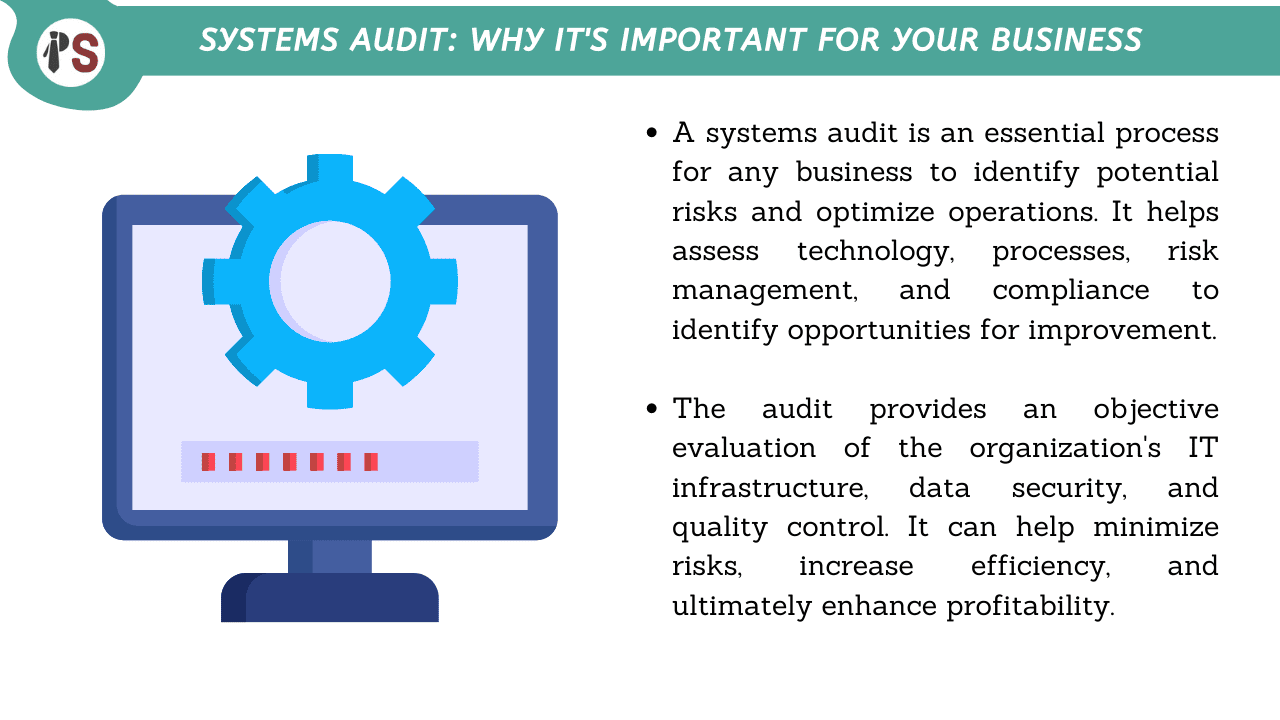
A systems audit is an essential process that helps businesses to identify and evaluate the efficiency and effectiveness of their internal controls, IT systems, and financial reporting processes. It involves reviewing all the business systems, processes, and controls to ensure they are working effectively and efficiently. In this blog, we will discuss the importance of systems audit for your business and how it can help you identify gaps and improve the overall performance of your organization.
Identifying Gaps in Internal Controls: A systems audit can help businesses identify gaps and weaknesses in their internal controls. By reviewing the controls in place, auditors can detect any potential risks or frauds and provide recommendations to improve the internal control environment.
Ensuring Compliance with Regulations: A systems audit can ensure compliance with various laws, regulations, and industry standards. These audits can help businesses identify compliance gaps and avoid potential penalties, fines, and legal risks.
Improving Efficiency and Effectiveness: A systems audit can help businesses identify inefficiencies and areas for improvement. By evaluating existing processes, auditors can provide recommendations for streamlining operations and reducing costs.
Enhancing Financial Reporting: A systems audit can ensure that financial statements are reliable and accurate. By reviewing the financial reporting process, auditors can identify any errors or inconsistencies in financial statements, improve the accuracy of financial reports, and ensure compliance with accounting standards.
Plan the Audit: A well-planned audit is essential for the success of the process. Auditors should understand the objectives of the audit, identify the scope of the audit, and create a detailed plan for conducting the audit.
Perform Risk Assessment: Auditors should perform a risk assessment to identify the areas of the business that have the highest risk of fraud or error. This will help auditors focus their efforts on areas of the business that are most critical.
Document the Process: It is essential to document the entire audit process, including the scope, methodology, and results. This documentation will help auditors communicate their findings to management and stakeholders and ensure that the recommendations are implemented.
Evaluate Internal Controls: Auditors should evaluate the internal control environment of the business to identify any weaknesses and gaps. This evaluation will help auditors provide recommendations for improving the internal control environment and reducing the risk of fraud and error.
Follow-Up: Auditors should follow up with the management team to ensure that the recommendations are implemented and are effective. This will help businesses to continuously improve their processes and controls and ensure compliance with regulations and standards.
In conclusion, a systems audit is an essential process for businesses to ensure compliance with regulations, improve efficiency, and identify gaps in their internal controls. By following best practices for conducting a systems audit, businesses can improve their financial reporting, reduce the risk of fraud and error, and continuously improve their operations. Therefore, it is important for businesses to prioritize systems audit and allocate resources to ensure the process is conducted effectively and efficiently.
At Professional Saathi, we offer a range of business consultancy services that help businesses improve their performance, achieve growth, and overcome challenges.
Copyright 2026 © Created By KTPG PROFESSIONAL SAATHI CORPORATE CONSULTANT PRIVATE LIMITED, All Rights Reserved.
Leave Your Comment